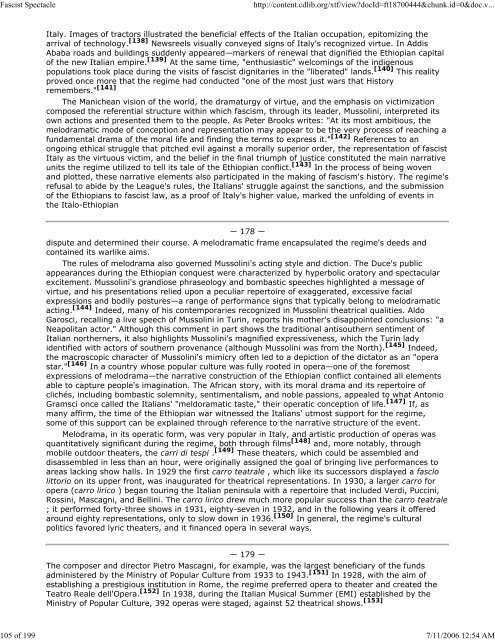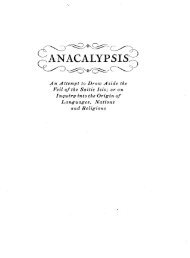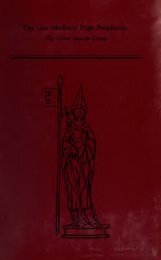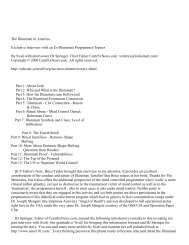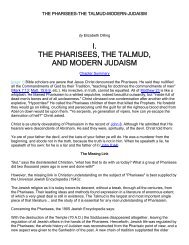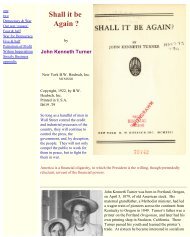You also want an ePaper? Increase the reach of your titles
YUMPU automatically turns print PDFs into web optimized ePapers that Google loves.
<strong>Fascist</strong> <strong>Spectacle</strong> http://content.cdlib.org/xtf/view?docId=ft18700444&chunk.id=0&doc.v...<br />
Italy. Images of tractors illustrated the beneficial effects of the Italian occupation, epitomizing the<br />
arrival of technology. [138] Newsreels visually conveyed signs of Italy's recognized virtue. In Addis<br />
Ababa roads and buildings suddenly appeared—markers of renewal that dignified the Ethiopian capital<br />
of the new Italian empire. [139] At the same time, "enthusiastic" welcomings of the indigenous<br />
populations took place during the visits of fascist dignitaries in the "liberated" lands. [140] This reality<br />
proved once more that the regime had conducted "one of the most just wars that History<br />
remembers." [141]<br />
The Manichean vision of the world, the dramaturgy of virtue, and the emphasis on victimization<br />
composed the referential structure within which fascism, through its leader, Mussolini, interpreted its<br />
own actions and presented them to the people. As Peter Brooks writes: "At its most ambitious, the<br />
melodramatic mode of conception and representation may appear to be the very process of reaching a<br />
fundamental drama of the moral life and finding the terms to express it." [142] References to an<br />
ongoing ethical struggle that pitched evil against a morally superior order, the representation of fascist<br />
Italy as the virtuous victim, and the belief in the final triumph of justice constituted the main narrative<br />
units the regime utilized to tell its tale of the Ethiopian conflict. [143] In the process of being woven<br />
and plotted, these narrative elements also participated in the making of fascism's history. The regime's<br />
refusal to abide by the League's rules, the Italians' struggle against the sanctions, and the submission<br />
of the Ethiopians to fascist law, as a proof of Italy's higher value, marked the unfolding of events in<br />
the Italo-Ethiopian<br />
― 178 ―<br />
dispute and determined their course. A melodramatic frame encapsulated the regime's deeds and<br />
contained its warlike aims.<br />
The rules of melodrama also governed Mussolini's acting style and diction. The Duce's public<br />
appearances during the Ethiopian conquest were characterized by hyperbolic oratory and spectacular<br />
excitement. Mussolini's grandiose phraseology and bombastic speeches highlighted a message of<br />
virtue, and his presentations relied upon a peculiar repertoire of exaggerated, excessive facial<br />
expressions and bodily postures—a range of performance signs that typically belong to melodramatic<br />
acting. [144] Indeed, many of his contemporaries recognized in Mussolini theatrical qualities. Aldo<br />
Garosci, recalling a live speech of Mussolini in Turin, reports his mother's disappointed conclusions: "a<br />
Neapolitan actor." Although this comment in part shows the traditional antisouthern sentiment of<br />
Italian northerners, it also highlights Mussolini's magnified expressiveness, which the Turin lady<br />
identified with actors of southern provenance (although Mussolini was from the North). [145] Indeed,<br />
the macroscopic character of Mussolini's mimicry often led to a depiction of the dictator as an "opera<br />
star." [146] In a country whose popular culture was fully rooted in opera—one of the foremost<br />
expressions of melodrama—the narrative construction of the Ethiopian conflict contained all elements<br />
able to capture people's imagination. The African story, with its moral drama and its repertoire of<br />
clichés, including bombastic solemnity, sentimentalism, and noble passions, appealed to what Antonio<br />
Gramsci once called the Italians' "meldoramatic taste," their operatic conception of life. [147] If, as<br />
many affirm, the time of the Ethiopian war witnessed the Italians' utmost support for the regime,<br />
some of this support can be explained through reference to the narrative structure of the event.<br />
Melodrama, in its operatic form, was very popular in Italy, and artistic production of operas was<br />
quantitatively significant during the regime, both through films [148] and, more notably, through<br />
mobile outdoor theaters, the carri di tespi . [149] These theaters, which could be assembled and<br />
disassembled in less than an hour, were originally assigned the goal of bringing live performances to<br />
areas lacking show halls. In 1929 the first carro teatrale , which like its successors displayed a fascio<br />
littorio on its upper front, was inaugurated for theatrical representations. In 1930, a larger carro for<br />
opera (carro lirico ) began touring the Italian peninsula with a repertoire that included Verdi, Puccini,<br />
Rossini, Mascagni, and Bellini. The carro lirico drew much more popular success than the carro teatrale<br />
; it performed forty-three shows in 1931, eighty-seven in 1932, and in the following years it offered<br />
around eighty representations, only to slow down in 1936. [150] In general, the regime's cultural<br />
politics favored lyric theaters, and it financed opera in several ways.<br />
― 179 ―<br />
The composer and director Pietro Mascagni, for example, was the largest beneficiary of the funds<br />
administered by the Ministry of Popular Culture from 1933 to 1943. [151] In 1928, with the aim of<br />
establishing a prestigious institution in Rome, the regime preferred opera to theater and created the<br />
Teatro Reale dell'Opera. [152] In 1938, during the Italian Musical Summer (EMI) established by the<br />
Ministry of Popular Culture, 392 operas were staged, against 52 theatrical shows. [153]<br />
105 of 199 7/11/2006 12:54 AM


